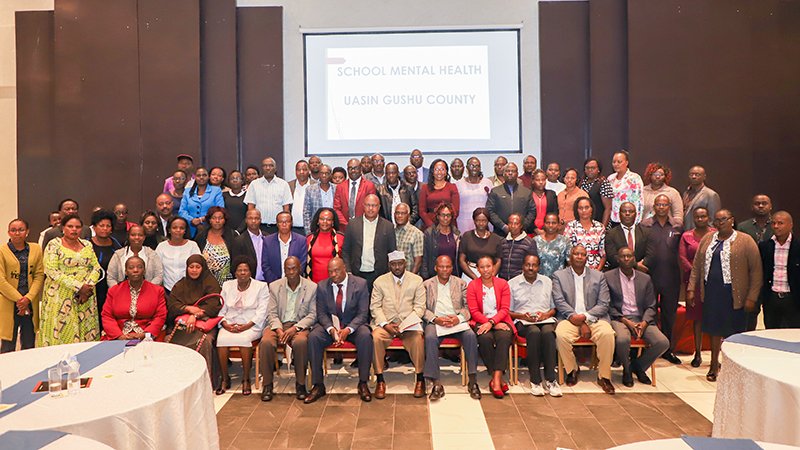There is No Health without Mental Health: AMPATH AYAM (Afya ya Akili Mashinani) Program Launches School Mental Health Program in Uasin Gishu County
The MTRH/AMPATH AYAM (Afya ya Akili Mashinani—meaning "community mental health”) program launched a school mental health program to promote youth mental health by sensitizing teachers, students, school staff members and parents.
The program will also build the capacity for career guidance teachers to deliver brief interventions in school as well as identify students with mental health conditions and link them to care. In addition, the program will train teachers to deliver an eight-module mental health literacy curriculum to students as part of the life skills training.
The initiative, funded by the Astellas Global Health Foundation, responds to a Ministry of Health report that estimates at least one in every five Kenyans has mental health challenges or has been diagnosed with at least one mental issue including anxiety disorder, depressive disorder, alcohol and substance use disorder, psychotic episode or suicide attempt. Additionally, 50% of mental health problems are established by age 14 and 75% by age 24. Edith Kwobah, MBChB, MMED, psychiatrist and director of Mental Health and Rehabilitative Services at Moi Teaching and Referral Hospital (MTRH) and Matthew Turissini, MD, from the Indiana University School of Medicine, are co-principal investigators for the Foundation’s grant and work together to lead the AMPATH mental health initiatives and conduct research to define the challenges for people living with mental illness in Kenya.
“There has been a process of stakeholder engagement,” explained Dr. Kwobah. “The first step was buy-in from the county leadership. The second step was a presentation of the program goals and activities to the various education stakeholders in the county including the Teacher’s Service Commission (TSC) and Ministry of Health to give them a chance to review and give input to the content. After this, we formed a committee that reviewed the training materials derived from the African school mental health curriculum and made some adaptations for the local context,” she continued.
The program was presented to the school heads and management board, marking the end of stakeholder engagement and the start of the actual implementation. The final meeting of the school mental health program in early July in Eldoret was officiated by Khalif Hassan, the Uasin Gishu County Director of Education. The event was attended by representatives from the Ministry of Education, Ministry of Health in Uasin Gishu County, TSC, school principals and head teachers, Board of Management chairs, guidance and counseling teachers, and the AMPATH AYAM team. The school-based mental health program will run interventions that include sensitization, prevention, and linkage to comprehensive mental health care for school children and adolescents.
During the final stakeholder meeting, Dr. Kwobah highlighted the importance of interventions, especially for children and adolescents. "Mental health conditions are widespread, under-treated, and under-resourced. It may be worse for children with mental health problems,” she said. “Many do not open up due to a lack of confidentiality and safe spaces or being misunderstood. A child as young as seven years may be depressed, and this may not be known to parents and teachers as many children may not have the vocabulary to express their feelings. This program will help teachers and parents identify the symptoms and warning signs and have early intervention."
The stakeholders agreed that implementing school interventions would curb mental health challenges and expand access to quality care for adolescent and youth mental illness and substance use in Kenya. These interventions will also break the community's myths and misconceptions about mental health conditions, build capacity for primary care providers to diagnose and manage common mental health disorders, and screen and link youth experiencing mental health challenges to health care facilities.
"In many African communities, mental health is associated with witchcraft and not recognized as a disorder at the community level. Cultural beliefs, stigma, lack of confidentiality while seeking help, lack of awareness about mental health, poor quality of care, and limited accessibility impede youth from seeking help. Schools play a vital role in identifying and assisting children with mental health problems at an early stage," added Dr. Kwobah.
The program will be piloted in six schools, consisting of three primary schools (Langas, Union, and Illula Primary Schools) and three secondary schools (Wareng High School, Central Secondary School and Chebisas Boys High School). It will then be scaled up to 20 schools within the county, and hopefully extended to the entire county. The ultimate goal is to have the program adopted for implementation at the national level. In the next three years, AMPATH AYAM hopes to make a significant impact in the lives of people through expanding access to and the quality of care for adolescent and youth mental illness and substance use, helping patients who have been severely affected to live as respected and valued members of the community and increasing access to effective substance use therapy in the community.



